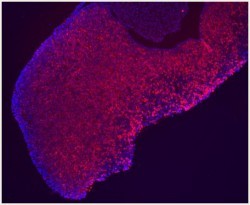 The secret to combating obesity could be within human beings, specifically in the same cells that are responsible for producing growth hormone. At least this is what could be concluded from the scientific results, published in the latest issue of the journal Endocrinology and in the review of the journal The New York Academy of Science. The investigation was conducted by Professor Raúl Luque (member of the Department of Cell Biology at the University of Cordoba) and the Illinois University researchers (USA). As other investigations carried out in the laboratory and on genetically modified mice have detected, somatotrophe cells (producers of growth cells) also operate as natural sensors. These cells detect and inform the body if there is an excess of nutrients to avoid fat accumulation and impaired glucose preconditions and determinants of obesity and diabetes.
The secret to combating obesity could be within human beings, specifically in the same cells that are responsible for producing growth hormone. At least this is what could be concluded from the scientific results, published in the latest issue of the journal Endocrinology and in the review of the journal The New York Academy of Science. The investigation was conducted by Professor Raúl Luque (member of the Department of Cell Biology at the University of Cordoba) and the Illinois University researchers (USA). As other investigations carried out in the laboratory and on genetically modified mice have detected, somatotrophe cells (producers of growth cells) also operate as natural sensors. These cells detect and inform the body if there is an excess of nutrients to avoid fat accumulation and impaired glucose preconditions and determinants of obesity and diabetes.
In order to achieve this result with possible therapeutic uses, the research team of the Department of Cell Biology has experimented with the elimination of specific genes in these cells. It has also been proven that the decrease in growth hormone levels that naturally occurs when ageing begins, could be the formula found by our body to avoid other problems such as diabetes. Growth hormone reaches its maximum presence during puberty and then declines. However, when this drop is excessive, changes occur and diseases such as obesity; caused by fat accumulation which is a defect and loss of muscle mass, and diabetes may appear.
Raul Luque, PhD in Biology from the University of Córdoba and member of the Maimonides Institute for Biomedical Research of Cordoba (Spain), has worked at the University of Illinois in Chicago. Since his return as a Ramon y Cajal Program investigator of the in 2008, he has directed several doctoral theses and a project of the National Investigation Plan for Research on growth hormone and extreme metabolic states such as obesity and anorexia.
Jueves, 22 Diciembre 2016 16:58
Scientists of the University of Cordoba prove the relationship between growth hormone and obesity
Escrito porIn collaboration with a North American team, researchers of Cordoba have discovered certain cells that act as natural sensors against the accumulation of fat
Publicado en
Biomedicina y salud

